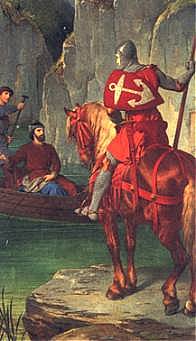Note: If you wish to receive, via e-mail, (1) my weekly newsletter or (2) daily copies of these posts, write to me at rrbates1951@gmail.com. Comments may also be sent to this address. I promise not to share your e-mail with anyone. To unsubscribe, write here as well.
Friday
My close friend Rebecca Adams recently suggested that there’s a fisher king feel to the transition from Joe Biden to Kamala Harris. The story of a maimed king presiding over a desolate wasteland—and of a knight rising up to save it—is a powerful archetype that has been told and retold over the centuries. Perhaps it is because Harris has tapped into that archetype that she is generating so much energy and excitement.
While the Arthurian narrative may have some explanatory value, however, I hasten to add that Joe Biden is no maimed king. He may be old but he is still proving to be an effective leader, as evidenced by how he engineered yesterday’s remarkable prisoner swap. Although he was 79 when he became America’s president, he has proved to be the most effective Democratic president since Lyndon Johnson, even while working with the tiniest of margins in the House and the Senate.
In short—and despite Donald Trump’s assertions to the contrary—America under Biden’s leadership is no wasteland.
But effective or not, the vibes that Biden set in motion with his poor debate performance—and that were exacerbated by the mainstream media piling on—persuaded many that he is a maimed king. Which is what Perceval encounters in his journey, first meeting the king fishing and later sitting in his bed. Here is that second encounter in Chrétien de Troyes’s version (trans. Burton Raffel):
Seated on a bed, in the middle
Of the hall, he saw a handsome
Knight with grizzled hair,
His head covered by a hat
As dark as a blackberry, wrapped
Like a turban in purple cloth.
And all his clothing was black.
He lay leaning on his elbow…
The king, while he proves to be as gracious as Biden, also must acknowledge his infirmity:
“My friend, don’t be offended
If I don’t rise to give you
Welcome, because I can’t.”
“Don’t speak of it, Sir, in the name
Of Our Lord. I’m not bothered,
God having granted me joy
And health.” With a great effort
The knight sat up as far
As he could: “Come closer, my friend:
Don’t be afraid. Come sit
Quietly at my side. It would make me
Exceedingly happy.”
Later in the story we’ll encounter a spear with a drop of blood at its tip and a grail. Instead of inquiring about these things, Perceval remains silent, and we later learn that his silence has devastating consequences.
Perceval receives the word from a damsel in distress that he encounters after leaving the castle, which has disappeared so that he finds himself in a desolate marsh. The woman informs him that the king, who had been wounded in battle, would have been cured if only Perceval had spoken up. Think of him as a complacent citizen who fails to vote:
You’re Perceval
The Unhappy, the Miserable, the Unfortunate!
Ah, how unlucky you are,
For had you asked those questions
You could have completely cured
The good king of all his wounds:
He would have become entirely
Whole, and ruled as he should.
How much good you’d have done!
The most famous modern use of the story, of course, is T. S. Eliot’s Waste Land. There are multiple references to the fisher king in the poem, including the following:
A rat crept softly through the vegetation
Dragging its slimy belly on the bank
While I was fishing in the dull canal
On a winter evening round behind the gashouse
Musing upon the king my brother’s wreck
And on the king my father’s death before him.
White bodies naked on the low damp ground
And bones cast in a little low dry garret,
Rattled by the rat’s foot only, year to year.
Eliot shows us a land that has been deprived of its vital life force:
What are the roots that clutch, what branches grow
Out of this stony rubbish? Son of man,
You cannot say, or guess, for you know only
A heap of broken images, where the sun beats,
And the dead tree gives no shelter, the cricket no relief,
And the dry stone no sound of water. Only
There is shadow under this red rock,
(Come in under the shadow of this red rock),
And I will show you something different from either
Your shadow at morning striding behind you
Or your shadow at evening rising to meet you;
I will show you fear in a handful of dust.
There were many experiencing abject fear as the mainstream media and a number of Democrats piled on Biden about his age. Again, I’m not saying that Biden himself was finished. There is a deep humanity in the president that, along with his stellar economic record, would (I believe) have carried him to reelection. (I rely on prognosticators with a good track record, like Christopher Bouzy and Alan Richtman, in making this prediction.) But it’s true there was a wastelandy feel to the election. For many people, it was as though we were witnessing a battle between two maimed kings.
Chrétien died before finishing the story but others stepped up with “continuations,” including some who imagined Perceval returning and becoming the new fisher king, presiding over a rejuvenated wasteland. Kamala Harris, multicultural candidate for a multicultural American future, has activated the archetype.


